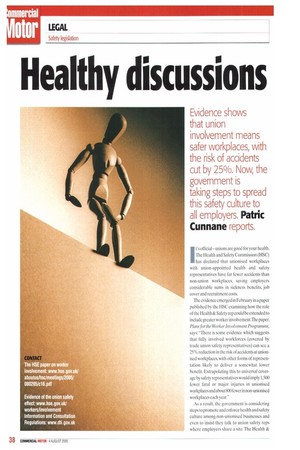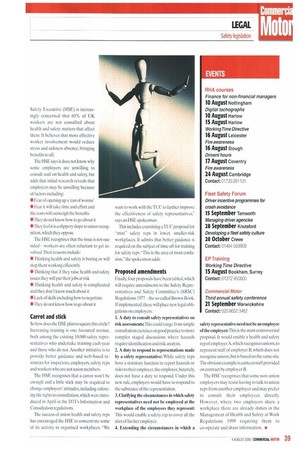Healthy discussions
Page 40

Page 41

If you've noticed an error in this article please click here to report it so we can fix it.
Evidence shows that union involvement means safer workplaces, with the risk of accidents
cut by 25%. Now, the government is
taking steps to spread this safety culture to all employers. Patric
Cunnane reports.
It's official— unions are good for your health. The Health and Safety Commission (HSC) has declared that unionised workplaces with union-appointed health and safety representatives have far fewer accidents than non-union workplaces, saving employers , considerable sums in sickness benefits, job -41 cover and recruitment costs. The evidence emerged in February in a paper published by the HSC examining how the role of the. Health & Safety rep could be extended to include greater worker involvement.The paper, Plans for the Worker Involvement Programme, says: "There is some evidence which suggests that fully involved workforces (covered by trade union safety representatives) can see a 25% reduction in the risk of accidents at unionised workplaces, with other forms of representation likely to deliver a somewhat lower benefit. Extrapolating this to universal coverage by safety representatives would imply 1,500 fewer fatal or major injuries in unionised workplaces and about 800 fewer in non-unionised workplaces each year."
As a result, the government is considering steps to promote and enforce health and safety culture among non-unionised businesses and even to insist they talk to union safety reps where employers share a site. The Health & Safety Executive (HSE) is increasingly concerned that 60% of UK workers are not consulted about health and safety matters that affect them. It believes that more effective worker involvement would reduce stress and sickness absence, bringing benefits to all.
The HSE says it does not know why some employers are unwilling to consult staff on health and safety, but adds that initial research reveals that employers may be unwilling because of factors including: • Fear of opening up a can of worms' • Fear it will take time and effort and the costs will outweigh the benefits • They do not know how to go about it *They feel it is a slippery slope to union recognition, which they oppose The HSE recognises that the issue is not one sided — workers are often reluctant to get involved.Their reasons include: • Thinking health and safety is boring or will stop them working efficiently • Thinking that if they raise health and safety issues they will put their jobs at risk • Thinking health and safety is complicated and they don't know much about it • Lack of skills including how to negotiate *They do not know how to go about it
Carrot and stick
So how does the HSE plan to square this circle? Increasing training is one favoured avenue, both among the existing 10,000 safety representatives who undertake training each year and those who do not. Another initiative is to provide better guidance and web-based resources for inspectors, employers, safety reps and workers who are not union members.
The HSE recognises that a carrot won't be enough and a little stick may be required to change employers' attitudes, including enforcing the rights to consultation,which were introduced in April in the DTI's Information and Consultation regulations.
The success of union health and safety reps has encouraged the HSE to concentrate some of its activity in organised workplaces. We want to work with the TUC to further improve the effectiveness of safety representatives," says an USE spokesman.
This includes examining a TUC proposal for "mini" safety reps in lower, smaller-risk workplaces. It admits that better guidance is required on the subject of time off for training for safety reps. "This is the area of most confusion," the spokesman adds.
Proposed amendments
Finally, four proposals have been tabled, which will require amendments to the Safety Representatives and Safety Committee's (SRSC) Regulations 1977— the so-called Brown Book. If implemented, these will place new legal obligations on employers: I. A duty to consult safety representatives on risk assessments: This could range from simple consultation exercises on good practice to more complex staged discussions where hazards require identification and risk analysis.
2. A duty to respond to representations made by a safety representative: While safety reps have a statutory function to report hazards or risks to their employer, the employer, bizarrely, does not have a duty to respond. Under this new rule, employers would have to respond to the substance of the representation.
3. Clarifying the circumstances in which safety representatives need not be employed at the workplace of the employees they represent: 'Ibis would enable a safety rep to cover all the sites of his/her employer.
4. Extending the circumstances in which a safety representative need not be an employee of the employer: This is the most controversial proposal. It would enable a health and safety rep of employer A, which recognises unions, to represent staff of employer B, which does not recognise onions, but is based on the same site. The obvious example is canteen staff provided on contract by employer B.
The HSC recognises that some non-union employers may resist having to talk to union reps from another employer and may prefer to consult their employees directly. However, where two employers share a workplace there are already duties in the Management of Health and Safety at Work Regulations 1999 requiring them to co-operate and share information. im




































































































































































































